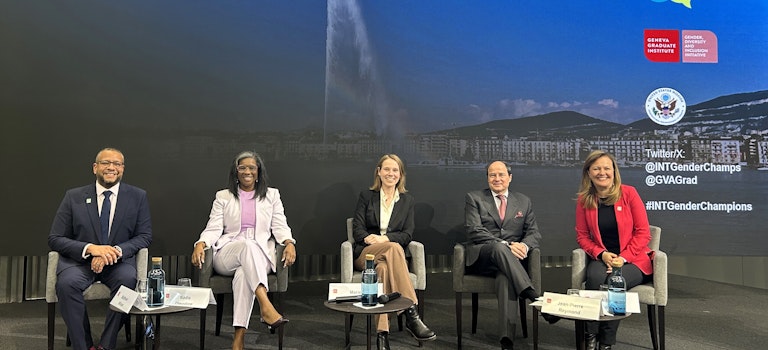Women and girls are disproportionately impacted by climate change and environmental degradation. Yet, there is a substantial gap between women’s particularly high stake in environmental conservation and their ability to act on it. While women around the world have emerged as important leaders for environmental protection, climate justice and an ecological transition, they remain significantly underrepresented in institutions forming environmental policy from community and national governance structures to international fora.
In this context, the International Gender Champions and the Geneva Graduate Institute, with the support of the Permanent Mission of the United States of America in Geneva, hosted their 5th Geneva Gender Debate. Every year, this event aims to promote dialogue and highlight barriers that need to be addressed to achieve gender equality through the art of debate. In the tradition of the Oxford Union Debates, the motion debated this year was: “This house believes that 50:50 representation of men and women should be made mandatory for all environment-related multilateral conferences, negotiations and fora.” To watch the full recording of the debate, please visit this link.

The opening remarks were given by the Executive Director of the Gender Centre and Professor of Gender at the Geneva Graduate Institute, Dr. Claire Somerville. In her introductory remarks, Dr. Somerville illuminated the successful history and part that quotas have played in multilateral negotiations and fora in Geneva. She cited the Inter-Parliamentary Union’s (IPU) requirement to have gender-balanced country delegations or risk voting sanctions as an example.
The Oxford-style debate was moderated by Geneva Graduate Institute’s Marie Holch, a master’s student in the Gender, Race, and Diversity programme.
Debaters assigned to argue in favour of the motion were:
- Adriana Quiñones, Head of Human Rights and Development, UN Women Geneva Office
- Jean-Pierre Reymond, Executive Director of 2050 Today.
Debaters assigned to argue against the motion were:
- Ambassador Matthew Wilson, Permanent Representative of Barbados to the UN and other International Organisations in Geneva
- Ambassador Nadia Theodore, Permanent Representative of Canada to the WTO in Geneva.
Executive Director of 2050 Today, Jean-Pierre Reymond kicked off the debate by signalling the precarious position that women and girls have been placed in by the effects of climate change, loss of biodiversity, and environmental degradation. Mr Reymond emphasised the importance of assertively changing systems by enforcing the 50:50 quota, as voluntary principles would not effect the change needed. He highlighted the gender gap in representation at COP, with only 5 out of 28 COP conferences having been chaired by women.
His teammate Adriana Quiñones, Deputy Head of UN Women Geneva Office, accentuated the importance of ensuring transformative change by having an affirmative action to ensure women’s participation, enhancing access to decision making power, providing funding for grassroot organisations at the ground level to participate in climate fora, and establishing equal opportunities for women to participate in environment-related multilateral conferences and fora.

Arguing against the motion, Ambassador Nadia Theodore, Permanent Representative of Canada to the WTO in Geneva started off by stating that equal representation goes beyond numbers. She argued that 50:50 is a blunt tool and that focusing on numbers failed to change the systems in place. “Decision making tables remain male, stale, and pale”. She highlighted the importance of addressing power asymmetries, contextual differences, and the urgent need for intersectional approaches.
Her teammate, Ambassador Matthew Wilson, Permanent Representative of Barbados to the UN and other International Organisations in Geneva, reinforced these sentiments by stating that “quotas cannot be the chosen catalyst.” He explained how mandatory numerical targets can further exacerbate and reinforce barriers to entry for some. They both called attention to the importance of creating lasting opportunities for a seat- and voice- at the table, and of implementing measures to create an enabling environment for meaningful participation beyond numerical representation.
The lively debate was closed off by Chair of the IGC Global Board and Secretary General of the Inter-Parliamentary Union, Mr. Martin Chungong, who thanked both teams for their participation and reaffirmed the need for inclusive and equal representation, diverse perspectives, and strong leadership in effectively addressing the climate emergency. He called for “everyone to persevere in their efforts to make climate justice a reality and advocate for inclusive policies and practices across the multilateral sphere.”
To watch the full recording of the debate, please visit this link.
